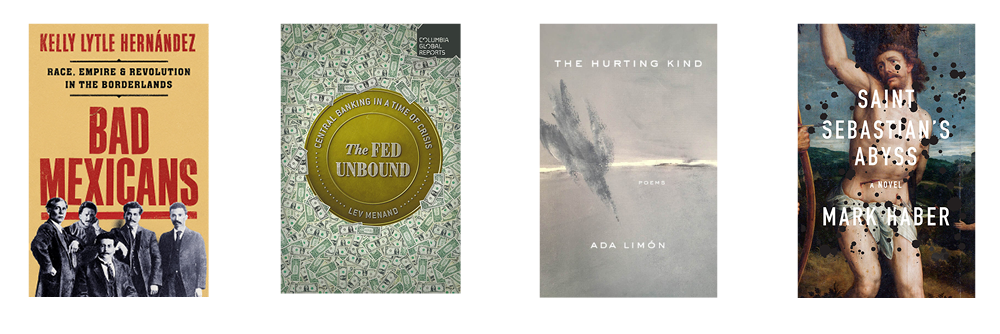Books to Watch | May 10, 2022
Looking for your next great read? We're here to help! Each week, our marketing team—Dylan Schleicher (DJJS), Gabbi Cisneros (GMC), Emily Porter (EPP), and Jasmine Gonzalez (JAG)—highlights four newly released books we are most excited about.
Book descriptions are provided by the publisher unless otherwise noted.
This week, our choices are:

Bad Mexicans: Race, Empire, and Revolution in the Borderlands by Kelly Lytle Hernández, W.W. Norton (JAG)
Bad Mexicans tells the dramatic story of the magonistas, the migrant rebels who sparked the 1910 Mexican Revolution from the United States. Led by a brilliant but ill-tempered radical named Ricardo Flores Magón, the magonistas were a motley band of journalists, miners, migrant workers, and more, who organized thousands of Mexican workers—and American dissidents—to their cause. Determined to oust Mexico’s dictator, Porfirio Díaz, who encouraged the plunder of his country by U.S. imperialists such as Guggenheim and Rockefeller, the rebels had to outrun and outsmart the swarm of U. S. authorities vested in protecting the Diaz regime. The U.S. Departments of War, State, Treasury, and Justice as well as police, sheriffs, and spies, hunted the magonistas across the country. Capturing Ricardo Flores Magón was one of the FBI’s first cases.
But the magonistas persevered. They lived in hiding, wrote in secret code, and launched armed raids into Mexico until they ignited the world’s first social revolution of the twentieth century.
Taking readers to the frontlines of the magonista uprising and the counterinsurgency campaign that failed to stop them, Kelly Lytle Hernández puts the magonista revolt at the heart of U.S. history. Long ignored by textbooks, the magonistas threatened to undo the rise of Anglo-American power, on both sides of the border, and inspired a revolution that gave birth to the Mexican-American population, making the magonistas’ story integral to modern American life.
The Fed Unbound: Central Banking in a Time of Crisis by Lev Menand, Columbia Global Reports (DJJS)
The Federal Reserve, the U.S. central bank, was built for a monetary system composed primarily of investor-owned, government-chartered banks. But over the years, the erosion of banking law and the rise of alternative forms of money created outside of the banking system have pushed the Fed to take on more and more responsibilities to keep the economy out of recession, as it did during the 2008 crisis, and again during the first months of the COVID-19 pandemic, when it created $3 trillion to stop another financial panic.
Legal scholar and former Treasury official Lev Menand explains how the Fed did this, and argues that it is time to cure the disease that has plagued the American economy for decades, and not just rely on the Fed to treat its symptoms. The Fed Unbound is an urgent appeal to Congress to reform the U.S. economic and financial infrastructure.
The Hurting Kind by Ada Limón, Milkweed Editions (GMC)
An astonishing collection about interconnectedness—between the human and nonhuman, ancestors and ourselves—from National Book Critics Circle Award winner and National Book Award finalist Ada Limón.
“I have always been too sensitive, a weeper / from a long line of weepers,” writes Limón. “I am the hurting kind.” What does it mean to be the hurting kind? To be sensitive not only to the world’s pain and joys, but to the meanings that bend in the scrim between the natural world and the human world? To divine the relationships between us all? To perceive ourselves in other beings—and to know that those beings are resolutely their own, that they “do not / care to be seen as symbols”?
With Limón’s remarkable ability to trace thought, The Hurting Kind explores those questions—incorporating others’ stories and ways of knowing, making surprising turns, and always reaching a place of startling insight. These poems slip through the seasons, teeming with horses and kingfishers and the gleaming eyes of fish. And they honor parents, stepparents, and grandparents: the sacrifices made, the separate lives lived, the tendernesses extended to a hurting child; the abundance, in retrospect, of having two families.
Along the way, we glimpse loss. There are flashes of the pandemic, ghosts whose presence manifests in unexpected memories and the mysterious behavior of pets left behind. But The Hurting Kind is filled, above all, with connection and the delight of being in the world. “Slippery and waddle thieving my tomatoes still / green in the morning’s shade,” writes Limón of a groundhog in her garden, “she is doing what she can to survive.”
Saint Sebastian's Abyss: A Novel by Mark Haber, Coffee House Press (EPP)
“What I wanted more than anything was to be standing beside Schmidt, in concert with Schmidt, at the foot of Saint Sebastian’s Abyss along with Schmidt, hands cupped to the sides of our faces, debating art, transcendence, and the glory of the apocalypse.”
Former best friends who built their careers writing about a single work of art meet after a decades-long falling-out. One of them, called to the other’s deathbed for unknown reasons by a “relatively short” nine-page email, spends his flight to Berlin reflecting on Dutch Renaissance painter Count Hugo Beckenbauer and his masterpiece, Saint Sebastian’s Abyss, the work that established both men as important art critics and also destroyed their relationship. A darkly comic meditation on art, obsession, and the enigmatic power of friendship, Saint Sebastian’s Abyss stalks the museum halls of Europe, feverishly seeking salvation, annihilation, and the meaning of belief.



